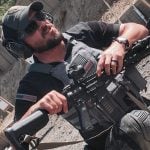Today, Daniel visits with Silencer Shop founder Dave Matheney. In just a little over a half-hour, they cover a lot of the important issues surrounding the topic of silencers:
- How did Silencer Shop get started?
- What value do suppressors offer in hearing protection?
- How Silencer Shop has revolutionized the purchasing process?
- What are some of the myths about silencers?
Whether you are a long-time advocate of suppressors or if you’re just beginning to learn about them (or somewhere in between), do yourself a favor and listen in on this interesting and very informative conversation.
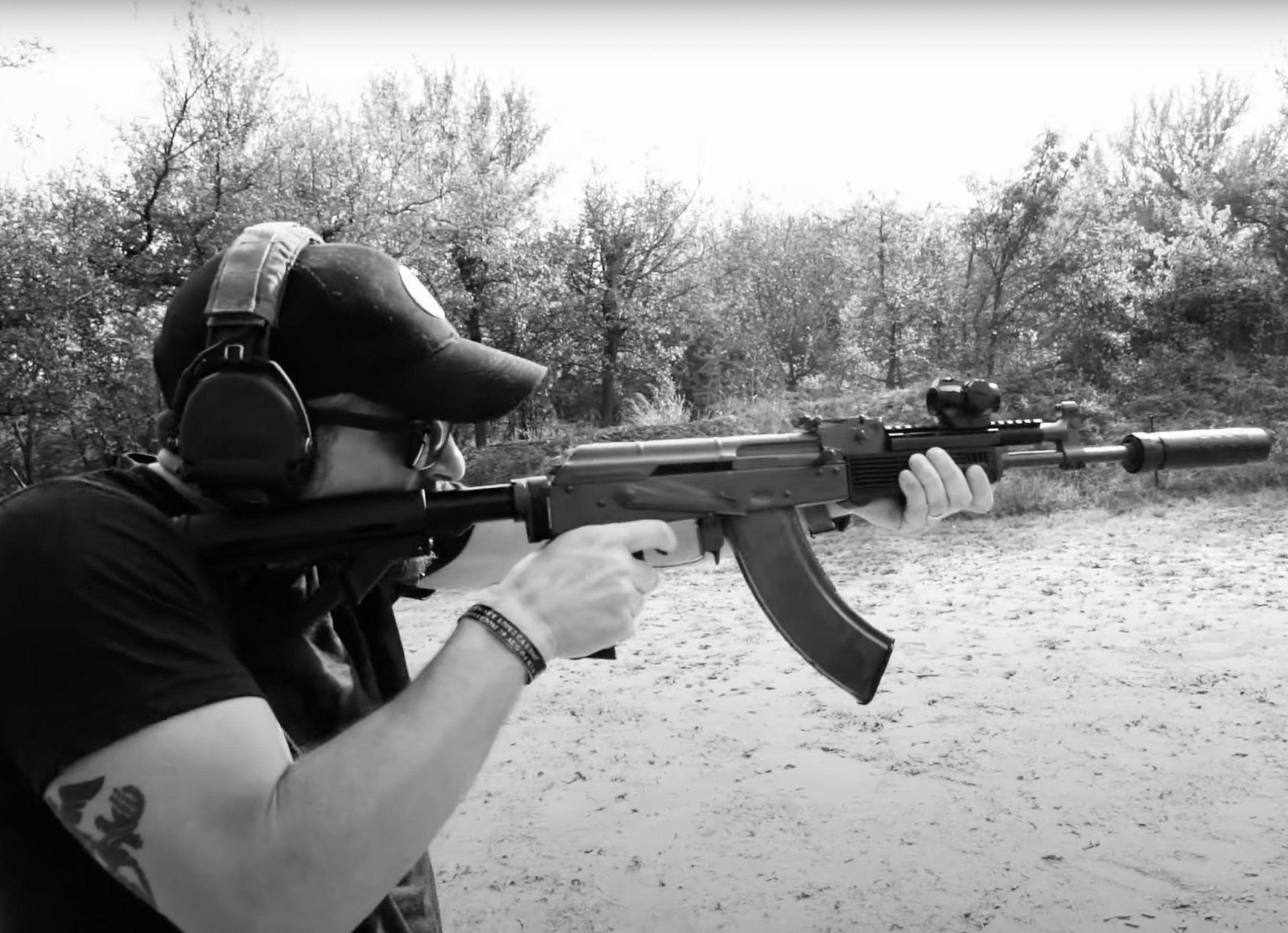
Host: Daniel Shaw
Guest: Dave Matheney
Introduction/Timeline: Stephanie Kimmell
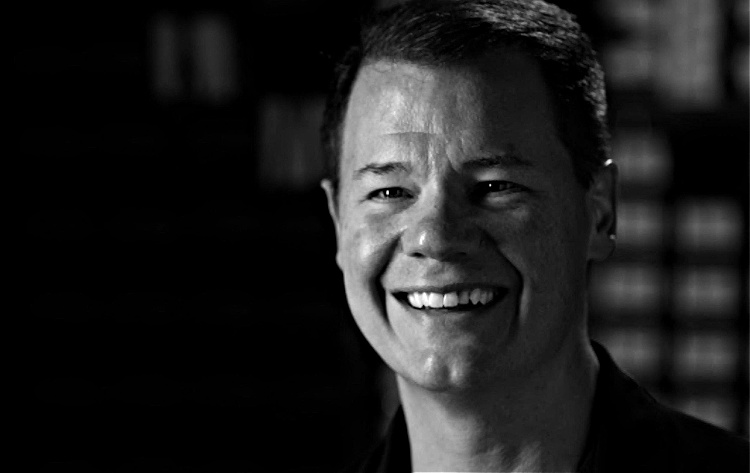
0:57 How did Dave get started in the suppressor niche?
It was kind of an accident. Dave’s son was born deaf in one ear, so Dave got into suppressors because of his hearing and it was never intended to be as big as it is. After a couple of bad experiences, his initial goal from the very beginning was to simplify the paperwork and make the transfer process easier for people. And that was the root of Silencer Shop. Even though they started out as a dealer, the goal was to make it simpler.
Daniel comments, “As a business, that’s creating a lot of value for the customer.”
Dave says, “In the early days, I’d have other dealers call and just chew me out saying, ‘You’re making it too easy. There needs to be a barrier to entry. People need to know what they’re doing on these forms.’ ” He compares it to people calling and complaining to their accountants for making taxes too easy. It’s just a ridiculous argument.
Daniel reflects on the similarities of Texas firearms instructors, when they were passing what they refer to as Constitutional Carry, or permitless carry. “All these instructors came out and said, ‘No, we need training. We have to train people, they can’t just carry a gun. That’s crazy, there’ll be blood in the streets.’ He notes that in every state that’s done this, we haven’t seen that happen yet.
2:43 So how did he start? Was he just out, selling them?
Dave says, “I think it was a shift in the way the market was thinking about silencers. Before that, it was kind of an elite club. There were very few in circulation, really, in the grand scheme of things. And it was going from that to mass market, and I think we were on the leading edge of that change — making this more accessible to the average person.”
Daniel agrees, continuing with, “And there was also something else happening right around that time frame that I credit a lot to SilencerCo — their ‘Suppressors are Legal’ campaign that they were doing around then. And it was such a powerful thing. You guys, making it easy, and SilencerCo explaining the legalities of it with a lot of their marketing messaging, and there was just a lot of good stuff going on.”
Dave remembers that, saying, “It was, like, 2010 to 2012. A lot was changing and SilencerCo’s message was a big piece of that. Making it easy, accessible, they had good products.”
3:58 What do you think really made this switch?
Dave thinks what really happened was that inflation caught up with the $200 tax, which was set in 1934. That, combined with the advancement of the internet, “where now people can kind of see that it was available… the market was really taking off and around 2008-1012. it kind of hit a point where all of a sudden it just exploded.”
5:20 You’re heavily involved with some of the legislative side of this thing too. What are you doing and what are the goals?
Dave says, “We’re very involved with that. We’re obviously involved with all the large Second Amendment and suppressor rights groups, American Suppressor Association (ASA) Pretty much name a group and we’re pretty much participating. But on our own, we really ten to push more for efficiency at the ATF. In my personal opinion, even though inflation has kind of caught up with the tax stamp, (which is a good thing for customers), the wait time is ridiculous. So to sit there and think, “I’m going to buy a suppressor in January, and get it in November,” that’s not acceptable in any world. There’s nothing you buy, other than maybe a custom special-order something that works that way.”
Daniel agrees, saying, “I will not order something from Amazon, sometimes, if it doesn’t have next-day shipping. I’d rather not have it if I can’t have it tomorrow. … I think I waited 13 months for mine. That was like 2013…”
Dave says, “That was the first time I ever saw wait times go for over a year. Prior to that, we had a note on the website that said if hits four months, contact us right away because something is wrong. Man, it spiked, and it spiked quick. And it’s been hovering in that 6-12 months for years now.”
7:19 So why are suppressors so awesome?
Daniel says, “One of the reasons I think they’re awesome, (and it’s kind of what got you started), is protecting hearing. And not just hearing for out there plinking at the range but protecting the hearing of law enforcement, service members, people who are using guns in self-defense situations.” He adds that suppressors make it possible to communicate better, and still think better without becoming disoriented anywhere from confined-space loud noises.
Dave points out that, “Hunters are also a key group. The hearing protection aspect of this is impossible to overstate. Silencers, in reality, are safety device. They’re not silent. Anybody who has shot with one knows that.”
He explains how silencers can prevent cumulative hearing loss, as in say, a self-defense situation, where you’re only shooting a few rounds. “But with those few rounds where you save your life, do you want to trade that for hearing damage for the rest of your life? Or hunting, where you take that one shot all day long…you talk to some of these old hunters, and they can’t hear you at all. They’ve got a hearing aid in both ears and still can’t tell what’s going on. It’s a little bit of hearing loss that’s cumulative over the course of their life, like I said, that one shot at a time — and they lose it so slowly, they don’t even realize it’s happening.”
9:44 How did Silencer Shop grow so quickly?
Daniel asks Dave about how the company has scaled. He points out that many of the great firearms companies started in somebody’s living room or garage. Is that how it went for Silencer Shop?
“It was exactly that. I was working full-time as a programmer, and I was one of those guys who loved my job. I wasn’t even looking to start a company, I never really planned to but it blew up faster than I was expecting. I was thinking side hobby — I like to shoot, I like guns.”
Dave says he worked as a programmer and ran Silencer Shop for over a year with someone working in his living room.
“I couldn’t handle the call volume, which drove my wife up the wall, by the way — just to have somebody walking around in our house… it was a crazy year and I finally go to the point where I just had to commit to it. I left my job.
He says the scaling aspect of the business was built into Silencer Shop from the beginning, “because since I couldn’t actually handle all of the work, and do my job. I spent a lot of time writing code to automate the process for myself, just so that I could do both. And then as Silencer Shop really started to explode, we kind of already had that framework.”
He says that they used software to tackle problems so they could focus their time on talking to customers and providing good customer service. That way, they weren’t spending time manually filling out paperwork and collecting information.
11:40 How did you make the process of acquiring a silencer easier for everybody?
When somebody buys a silencer through Silencer Shop, there are really two main ways. You can buy it through our website at silencershop.com or you can walk into any one of our Powered By dealers. We’ve got close to 4000 dealers all over the country that are Powered By Silencer Shop dealers.”
Here’s the process, if you buy a suppressor through a Powered By dealer:
- Visit a Powered By Silencer Shop dealer.
- Tell the dealer which suppressor you want to purchase.
- Pay for it.
- Within seconds, you’ll get a text with a QR code on it (a kiosk code).
- Scan the code on the kiosk.
- Take about five minutes to supply the information Silencer Shop needs.
- Take a photo on the mobile app.
- Silencer Shop takes care of the rest.
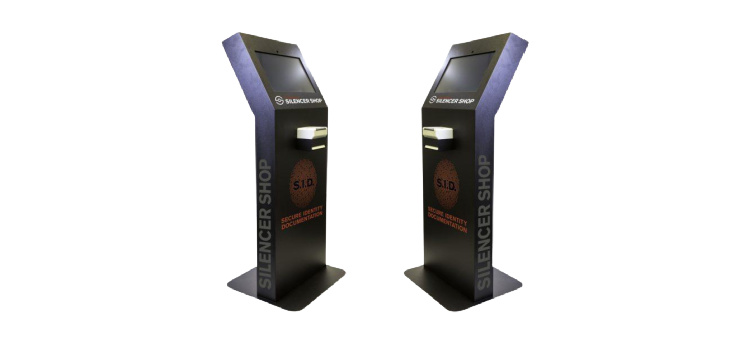
“So from that point, we take over. We basically review the information, the system will generate all the forms, and we get it off to the ATF. The second time you buy, you don’t even have to go through the kiosk. You can just walk into the store or go on the website and just make the purchase. Within a few minutes, you’ll get an email with documents to sign and it’ll go straight to the ATF. So it’s a very very simple process.”
[Note, for further information, read How to Use a Silencer Shop Kiosk.]
Dave says the hard part is the wait. “You finally get approved, and then ten months, you feel like a kid before Christmas — makes it feel like it was hard. But our goal is to make what you actually do as simple as possible.”
Daniel remembers when he bought his first suppressor: “When I bought mine I had to get a trust from a lawyer… fill out tons of stuff, all these pages by hand, then have it rewritten by the paralegal or somebody. Then I had to go to the Sheriff’s department to get fingerprinted… get passport photos, and I finally get my package together, mailed off to the ATF and I felt like I had won the Superbowl or something because I got it all done.
“What you just described is absolutely incredible. It’s so easy to go and get a suppressor. And I’ve seen your kiosk all over the country. It makes it so simple. I didn’t even realize it was that simple.
Dave follows through with more information about trusts:
“For most people, I do recommend trusts, but I actually recommend using a Single Shot trust. We put that on the order. There’s nothing to take and get notarized, nothing you fill out, it’s just part of the DocuSign, so it’s like two more clicks. And then it’s just you on the trust and you can write all the additional people on it after it gets approved. That way they don’t have to get fingerprinted and photographed and all the other overhead involved in buying.
“That Single Shot is the way to go for buying a silencer. I feel like that’s been a game-changer for the industry.”
He goes on to say how Silencer Shop helps buyers with the legal process, even if they buy their suppressor somewhere else.
“If you look at hard numbers with the ATF, they publish every year how many Form 4’s they see and process. We submit nearly 2/3 of all of the Form 4’s in the United States. But we only sell just over half of the silencers. So there’s about 16-18% of the silencers that we’re processing that people didn’t buy from us at all, and we have zero problem with that. That’s our business.”
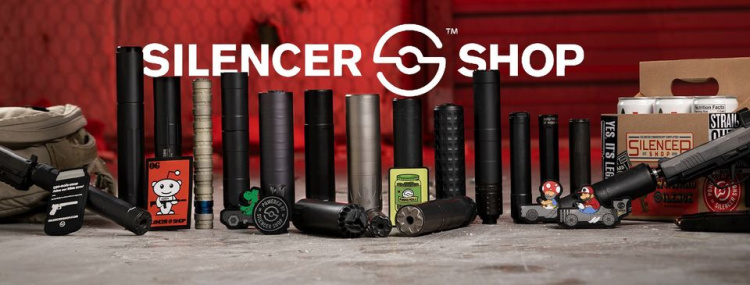
16:03 How have the suppressor laws changed?
Dave says that when he first got into the suppressor industry, there were a lot more differences from state to state.
“Like in Texas, for example, as crazy as it sounds you couldn’t hunt game animals with a silencer. You could hunt a hog, but you couldn’t hunt a deer. There were lots of states that had laws like that on the books. There were several states where you couldn’t hunt at all. In Missouri, (this was years ago) you could buy a silencer, but you had to have a C&R (Curio & Relics) FFL before you could make a purchase. It’s a special category of FFL which is a hassle to get.”
Dave says that the ASA has done a really good job of going state to state and making all of those laws more consistent.
“So pretty much across the board now, if you can own it, you can hunt with it, you can use it for self-defense… All of those issues have kind of gone away in the last ten years or so, in huge part thanks to ASA.”
And the changes continue to happen. Just weeks ago, Maine changed its law on hunting with a suppressor. Previously, you had to apply for a special permit.
“So they’re doing a good job of making this the same across the board.”
Of course, there are still some states where it’s just not legal, like California and New York.
18:44 What is a good resource for people to use to check out for the legalities of suppressors in their state?
The ASA website is going to be the master source, but Silencer Shop has a lot of information on it’s website, which includes a robust block with a lot of informational articles.
Dave says, “We want to make this stuff accessible and demystify it.”
19:30 What are some of the myths about suppressors that just aren’t true?
The myths have changed over time but Dave lists a few that have been hard to kill.
“The big one that I always used to hear was that you have to have a class 3 license to buy a silencer. I still hear that from time to time and that’s just not true. There’s no real license to buy a silencer. You pay a tax, they’ll run a background check, you’re good to go. It’s not really a license, it’s more of a transfer to your ownership… The dealer has to have a class 3 license, not a customer.”
Another myth is the idea that silencers are silent like they’re portrayed on TV, which just isn’t reality.
Dave says, “My favorite comparison is that an AR-15 with a suppressor on it is the same loudness as a jack-hammer on concrete. It is not silent at all. You can still hear it just fine… I don’t know what it’ll take to make that go away other than just more people owning them. As more people own them, more people think, ‘Oh, they’re quieter but not silent.'”
Then, there’s the idea that a gun has to be subsonic to shoot it suppressed.
Dave explains why that’s not true. “People think that the supersonic crack is all of the sound. That’s actually not true at all. The majority of the sound from a shot is actually the muzzle blast. The supersonic crack does make sound but it’s at the end of your barrel and it’s moving away from you so it doesn’t tend to be a painful source of sound in most scenarios — or a not hearing-safe source of sound.”
“Some of my favorite guns to shoot suppressed… like .338 Lapua — maximum charge bolt gun— it’s not subsonic, not even close to it, but you throw a suppressor on there and it goes from painful to being like ‘Oh man, I can handle that, that’s actually pretty cool!'”
Daniel brings up another myth. He says, “I used to work as a trainer in an indoor range in a retail facility and we had a lot of folks come in and say, ‘Oh no, I’m not getting a suppressor or any NFA item because then the police can come over to your house any time that they want to.'”
Dave says that idea comes from putting two things together: the myth that you have to get a Class 3 license + the fact that a Class 3 license is a dealer license which allows the ATF to come and inspect you any time they want.
“But that’s just not the reality. If you buy a silencer, that does not give ATF license to come without a warrant to look in your house. They can’t request to see stuff, you don’t lose any rights.”
28:07 What’s the best part about selling suppressors?
Daniel talks about his time working in a gun store, and how one of his favorite things was selling suppressors. Often the customers were really excited. They’d been saving their money for it, and after they made the purchase, “…they could come see it for conjugal visits, I’d go grab it out of the safe, and bring it in and let them go down to the range and shoot it… and they loved that and it was awesome. And I loved doing it because I was providing a service for them. And when that stamp came in, they got to take it home, so it was great.”
Dave tells one of his favorite stories from the early days of running Silencer Shop. One of their customers was super excited. He had gone through the waiting time to get approved… “I think he lived in Houston. We’re in Austin, and his wife actually came up to pick up the silencer for him. They were on a trust, so that’s all pretty typical actually.
“So she’s in there picking it up and you hear him on the phone. He’s super excited, [saying] “Can you take a picture of it? What does it look like?” You know, he’s asking her all of these questions, and she just pauses, “Uh, it’s a black tube.”
“It was just the excitement, you know, being… like a kid before Christmas for however many months the ATF is sitting on your paperwork. And it is fun to help customers out with the process.”
30:16 Where can people find more information about Silencer Shop or track down a kiosk?
Check out the Silencer Shop website to find a dealer and local kiosks. Also, the blog has a lot of informative articles and you can find Silencer Shop on Facebook, Instagram, and Reddit.
“Really, you’re going to find us anywhere people are talking about silencers. At least that’s the goal.”
Podcast: Play in new window | Download


